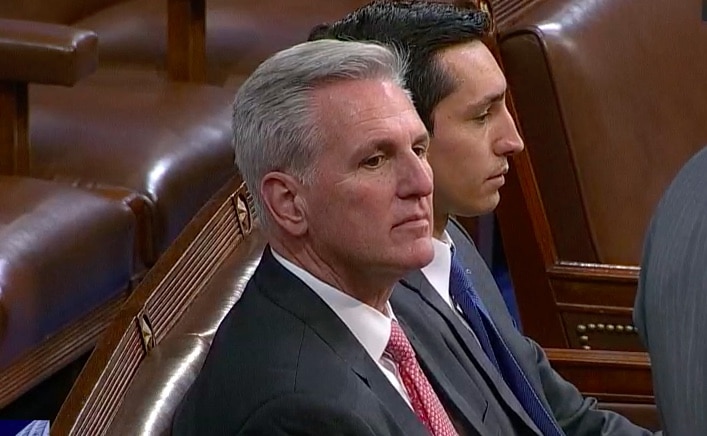House Speaker Kevin McCarthy (R-CA) on Monday called on President Biden to agree to compromises and spending cuts as the pair remained deadlocked over raising the nation’s debt ceiling.
McCarthy spoke one day before Biden was set to deliver the annual State of the Union address before a joint session of Congress, getting himself out ahead of the President, who is likely to talk about disastrous economic consequences if Congress doesn’t raise the government’s $31.4 trillion spending limit by June.
“The greatest threat to our future is our national debt,” McCarthy said in the 10-minute address.
Biden and McCarthy held their first face-to-face meeting on the debt ceiling on Wednesday. Biden is looking for a “clean” debt ceiling increase with no strings attached—including no spending cuts. He is expected to say during the State of the Union that the debt limit is non-negotiable, and that lawmakers should not use it as a “bargaining chip,” according to White House Economic Adviser Brian Deese.
In his address on Monday, McCarthy argued that the debt limit has long been used to push for spending reforms—including by then-Senator Biden during debt fights two decades ago.
“Now we must return Washington to a basic truth: Debt matters. The debt limit is one of the most important opportunities Congress has to change course,” McCarthy said, adding, “Defaulting on our debt is not an option, but neither is a future of higher taxes, higher interest rates and an economy that doesn’t work.”
Treasury Secretary Janet Yellen had warned in a letter to Congress in mid-January that the federal government was projected to reach its roughly $31.4 trillion borrowing limit as of January 19, adding,”Once the limit is reached, Treasury will need to start taking certain extraordinary measures to prevent the United States from defaulting on its obligations.”
She said those measures would allow the government to buy time so that Congress can negotiate and pass a debt limit increase—but that purchased time would likely “be exhausted before early June.”
A debt default by the U.S. could shake economies worldwide. The U.S. could also face a recession, including higher unemployment. The stock and bond markets would likely plunge, potentially wiping out 6 million jobs and $15 trillion in wealth, according to Moody’s. Americans who receive benefits like Social Security risk not getting those monthly checks.
The United States has never defaulted on its debt. But it has repeatedly come close, perhaps most notably in 2011 when the U.S. suffered its only credit rating downgrade in its history, amid the rise of the conservative tea party movement in the House.


